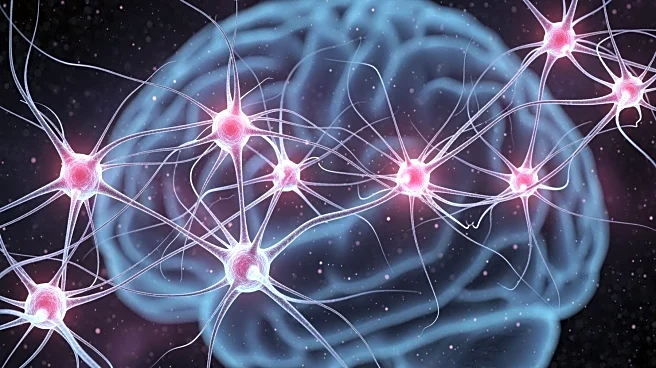What's Happening?
Recent research published in Nature has identified astrocytes, a type of brain cell, as crucial in stabilizing emotional memories for long-term recall. Traditionally thought to support neurons, astrocytes have
been found to play a more active role, particularly in response to repeated emotional experiences. This discovery could pave the way for new treatments for memory-related conditions such as post-traumatic stress disorder and Alzheimer’s disease. The study, led by Jun Nagai at the RIKEN Center for Brain Science, focused on how short-term memories become permanent. Using a fear-conditioning task with mice, researchers observed that astrocytes were more active during memory recall than during initial learning, suggesting their importance in stabilizing memories.
Why It's Important?
The identification of astrocytes as active participants in memory stabilization challenges previous assumptions about their role in the brain. This finding opens new avenues for research into memory-related disorders, potentially leading to innovative treatments targeting astrocytes. Conditions like PTSD and Alzheimer’s, which involve memory dysfunction, could benefit from therapies that enhance astrocyte function. Understanding the cellular mechanisms behind memory stabilization also contributes to the broader field of neuroscience, offering insights into how the brain processes and retains information. This research underscores the complexity of memory formation and the potential for targeted interventions.
What's Next?
Following this discovery, further research is likely to explore how astrocytes can be manipulated to improve memory retention and recall. Clinical trials may be developed to test treatments targeting astrocyte activity in patients with memory disorders. Additionally, neuroscientists may investigate other brain cells that could play similar roles in memory stabilization. As the understanding of astrocytes' functions expands, it could lead to a paradigm shift in how memory-related conditions are approached, with a focus on cellular-level interventions.
Beyond the Headlines
The study highlights the intricate interplay between different types of brain cells in memory formation, suggesting that the brain's capacity to store memories is more complex than previously thought. This research may influence how neuroscientists conceptualize brain function, potentially leading to a reevaluation of existing models of memory processing. The ethical implications of manipulating brain cells for therapeutic purposes could also be a topic of discussion, as researchers balance the potential benefits with considerations of safety and long-term effects.










